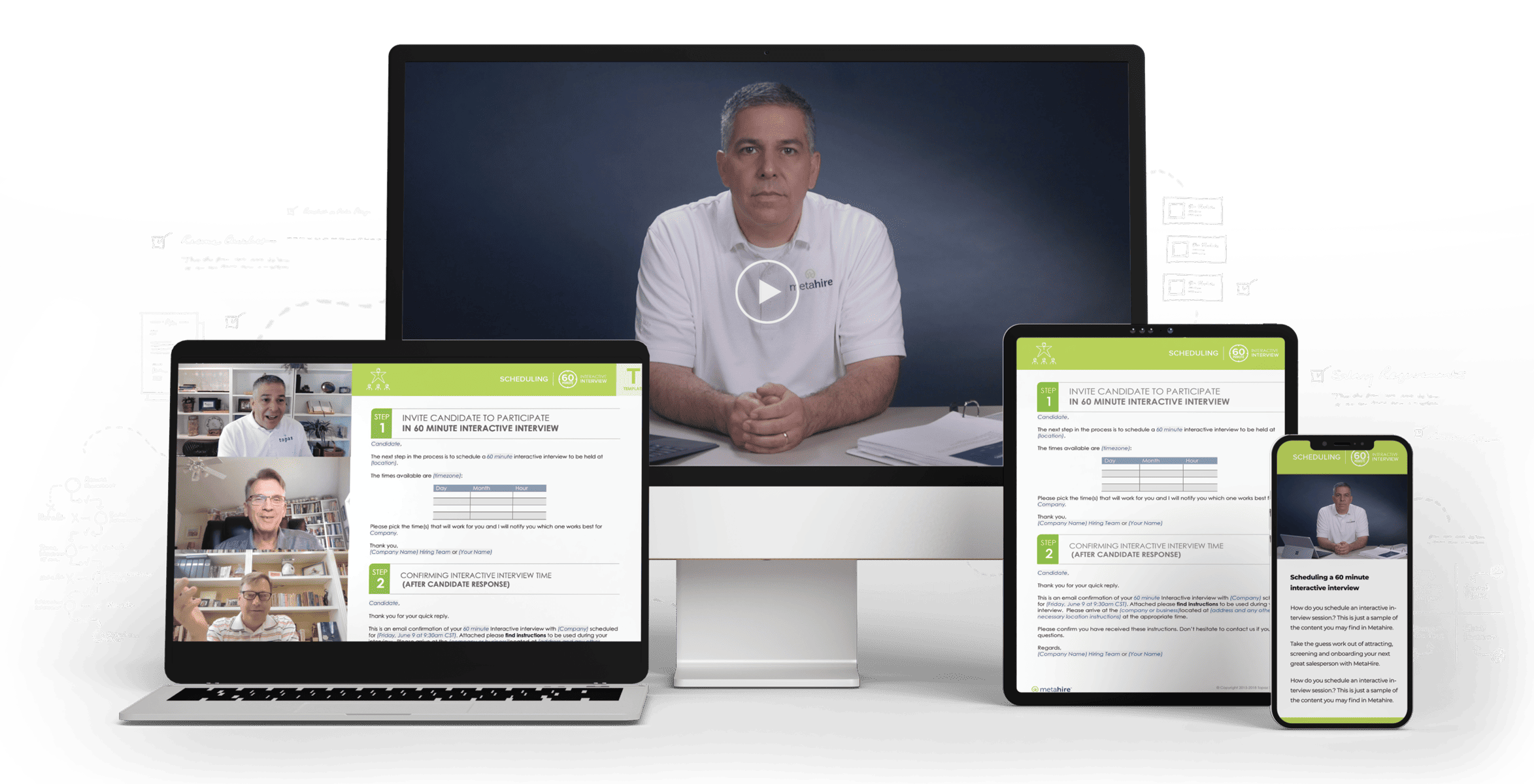Sales is often seen as the lifeblood of most businesses, yet the hiring process for salespeople tends to be inconsistent at best.
Many companies don’t know what they should be looking for when hiring a salesperson and, as a result, end up making bad decisions. But why is making consistent hiring decisions problematic for so many different businesses?
The importance of consistency in hiring for sales positions cannot be overstated. Hiring managers need to be sure that they are looking for the same qualities and using the same evaluation process for all candidates, which is essential to choosing the best candidate. We’re here to help you dive into the question and uncover some sales competencies and recruitment tips along the way.
Take a look at how our team at Topaz Sales Consulting can revolutionize how you approach your sales hiring process.
Hiring inconsistency in sales is expensive, creates job vacancies, and causes confusion.
Making the wrong decision about a candidate can be costly for your organization
Sales organizations that regularly suffer from hiring inconsistency experience a severe impact on their bottom line. This is due to onboarding, training, benefits, compensation, and other expenses. Nobody wants to go through a lengthy hiring process only to find out six months down the road that they’ve ultimately made a significant and costly mistake.
The first step to creating a consistent hiring process is to develop a clear understanding of your ideal candidate. Once you’ve determined what the prototypical salesperson should look like, develop a recruitment experience that generates the types of candidates you need to fill vacant positions while weeding out those who will waste your time and resources. By creating a consistent hiring process, you can always have the best sales team possible and avoid making expensive hiring (and re-hiring) mistakes.
The inconsistency in hiring for sales positions can leave positions vacant
The sales industry is notoriously competitive. In order to succeed, companies need to hire the best and brightest talent, but as we’ve mentioned, recruiting salespeople is often haphazard and inconsistent. As a result, many sales positions remain vacant for months at a time! With an ever-changing sales landscape, it’s critical to implement a versatile sales hiring system designed to identify ideal candidates based on your company’s unique needs. In a competitive market, your hiring process needs to be succinct and efficient to ensure your company has the greatest opportunity to land top talent. This means that companies need to invest in a solid recruitment process to attract top sales talent — otherwise, they will continue to struggle to fill their sales positions.
Hiring managers often look for different qualities in candidates, which can be confusing
When it comes to hiring, managers often look for different qualities in candidates, even if they’re interviewing for the same position. This can lead to confusion, as different managers may have different priorities and want to grow their team in specific ways. For example, one manager might value experience over education, while another might emphasize personality. Job seekers need to research the preferences of each hiring manager to make the best impression, but it’s equally essential that all hiring managers within an organization are aligned on hiring priorities and goals to yield the best results.
What to look for when hiring a salesperson
You want your sales team to increase your revenue, so you want to make sure you’re hiring people who can build long-term relationships, qualify for good mutual fit, and close deals. That’s why we’ve oriented our entire Metahire process around helping our clients identify which candidates have the necessary qualifications for the job.
The Top Qualifications to Look for in Sales Candidates
Core Values. To find candidates with the greatest potential culture fit, you want them to be aligned with your core values. What’s most important to them? What types of values do they look for in an employer? How do they treat others and expect to be treated in return?
Coachable and want to learn continuously. Every sales job has a learning curve, so it’s normal for new candidates to stumble or take a while to acclimate to their new work environment. With that said, look for attributes in a candidate that indicate they’re coachable and can learn quickly to get up to speed with your organization.
Positive attitude. Look for someone with a good attitude towards sales, being a part of a team, and growing their career with your company. They should be positive and enthusiastic and genuinely have an interest in being an ideal fit with your culture.
Knowledgeable. Hire people who are already knowledgeable about the product or service you’re selling. Of course, you can’t expect perfection or mastery here during the interview process, but someone who has demonstrated that they’ve put in the time to research what your business does, who your customers are, and how you position yourself in your industry is the type of person who will rise to the occasion and become top performers.
Relationship-focused. Success in sales isn’t only about closing deals — it’s also about building relationships. Candidates who are laser-focused on the customer and their needs rather than on themselves and their commission will become your team’s ultimate sales leaders. Most importantly, relationship-focused salespeople are the backbone of referral-based business and repeat business.
Past Performance. While past performance doesn’t necessarily guarantee future success, it’s still vital for you to verify from a candidate’s experience that they can close deals and achieve sales goals. If they’ve consistently met quota and proven they can remain at the top of their organizations in previous roles, you can have an added layer of confidence they’ll do the same for you.
Reliability and Trustworthiness. You’re building a team, so your candidates should be reliable and trustworthy team players. But in sales, where commission and bonuses are often based on individual performance, you must be doubly sure your salespeople can be counted on. The last thing you want is a salesperson who’s always looking out for themselves and their interests rather than the team’s overall well-being.
Work Ethic. Clocking out early, taking extended breaks, and missing time at work are ingredients for a recipe for failure. Suitable candidates should have a solid work ethic and be motivated to succeed without constant reminders that hard work is required to succeed in a sales role. They should demonstrate excitement to put in the hours to earn commissions and promotions.
Communication Skills. Candidates should have strong communication skills, both written and verbal. They should express themselves clearly and concisely, without sounding sales-y. Keep an eye on how promptly they follow up after interviewing, their tone on phone calls, and how they communicate in person.
Unconditional Commitment. When you ask a candidate what they’re willing to do to succeed, the answer should be “anything and everything,” ethically speaking, of course! If they aren’t passionate about their job, they won’t go the extra mile to make a sale happen, which means you won’t reach your company’s sales goals.
Top performers are a needle in the haystack, and the Metahire platform is designed to help you find them. With our pre-hire sales assessment and job-specific simulations and role-plays, we can help you identify which candidates can excel in your company.
Want more sales hiring tips like these? Check out our other blog posts and case studies!
How to uncover these sales competencies in candidates
Using a structured and strategized interview process is important to uncover ideal competencies in sales candidates. But what does having a structured or strategized interview process mean?
This means developing well-crafted job descriptions that translate into job postings that accurately reflect the desired skills and experience you’re looking for. Additionally, using various interview techniques such as behavioral-based questions, role-plays, and assessments will help you get the information you need to make an informed decision. Let’s look into these steps a bit further.
Job Descriptions
Developing an accurate job description is one of the foundational elements of uncovering ideal competencies. This internal document should outline the specific skills and experience required for the role, as well as the desired personal traits and attributes. Once this job description is created, you can use it to develop targeted interview questions that will help assess whether a candidate has the necessary skills and qualities. After finalizing your ideal candidate through your detailed job description, it’s time to post the job.
Job Posting
Your actual job posting should feel more like a piece of marketing collateral than an internal document. This is because you want to attract the attention of top sales talent, and one of the best ways to do that is by making the job posting stand out. Be sure to use language that accurately reflects the role and what you’re looking for. Tell a compelling story about why your company is a great one to work for, referencing relevant components of the position that will catch applicants’ attention.
For example, if you’re looking for a salesperson with experience in the tech industry, be sure to use keywords such as “software,” “SaaS,” and “cloud-based” to outline what you’re looking for clearly. By using language specific to the role, you can help attract candidates who have the ideal qualifications.
Screening
After you’ve developed a well-crafted job posting and have attracted some attention from top sales talent, it’s time to start the screening process. Phase one involves reviewing and filtering out bad resumes, pre-interview assessments, and pre-interview communications. Phase two includes a handful of shorter interviews, often conducted over the phone, to screen candidates for general communication styles, background, culture fit, etc. Phase three involves a more in-depth and rigorous in-person interview that challenges candidates to rise to the occasion and put their best foot forward. Using these various assessment techniques can help you better understand a candidate’s skills and abilities and if they’ll be an excellent organizational culture fit.
The interview process for sales positions
Generally, three types of interviews are screening, behavioral, and skills-based. Screening interviews are typically short and designed to weed out candidates who are not a good fit for the position. Behavioral interviews focus on past experience, aiming to determine how the candidate has handled various sales-related challenges. Skills-based interviews test the candidate’s knowledge of multiple sales concepts.
The interview process can be daunting for candidates, but your job is to try to get to know them better and see if they’d be a good fit for the role and your organization and vice versa. During the actual interview, ask behavioral-based questions, allowing candidates to share specific examples of their skills and experience. It can also be helpful for sales roles to conduct a role-play to assess how candidates would handle a real-life sales situation. Many salespeople have mastered the art of talking the talk, but make sure to see if they can also walk the walk. By conducting a thorough and well-planned interview process, you can increase your chances of making a great hire.
Are you serious about consistency?
Companies that are serious about their sales teams need to be just as serious about their recruitment processes. After all, the sales force is the heart of any business – they generate revenue and drive growth. So, companies must take the time to find the best possible candidates while eliminating tolerance for mediocrity. That’s where our team comes into the picture.







